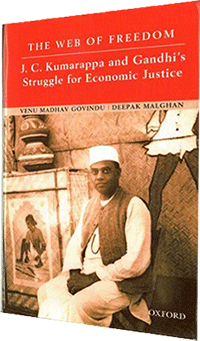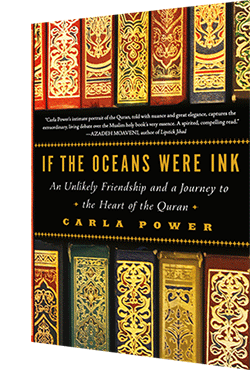J.C. Kumarappa and Gandhi’s Struggle for Economic Justice, Venu Madhav Govindu & Deepak Malghan ; oxford university press, Rs.895; Pages 388
 India’s national movement was special because it possessed social, economic and environmental dimensions in addition to the political goal of independence. And special among its participants was Joseph Cornelius Kumarappa, born in 1892 into a talented family of Tamil Christians close to India’s southernmost tip, in Palayamkottai.
India’s national movement was special because it possessed social, economic and environmental dimensions in addition to the political goal of independence. And special among its participants was Joseph Cornelius Kumarappa, born in 1892 into a talented family of Tamil Christians close to India’s southernmost tip, in Palayamkottai.
In Public Finance and India’s Poverty, his Master’s thesis at New York’s Columbia University, Kumarappa wrote in 1928, that the State not only had to curb the profligacy of individuals, it had to limit the danger that wasteful use of resources “may entail on the coming generations”.
In that same year, a man Kumarappa was yet to know, Mohandas Karamchand Gandhi, wrote in his journal Young India (December 20, 1928): “God forbid that India should take to industrialisation after the manner of the West. The economic impact of one single tiny island kingdom today is keeping the world in chains. If an entire nation of three hundred million took to similar economic exploitation, it would strip the world bare like locusts.”
Obviously fated to meet, the two did so on May 30, 1929 in Gandhi’s Sabarmati Ashram in Ahmedabad. Some days after this meeting, Joseph, wearing a three-piece suit, arrived at a khadi bhandar in Mumbai’s Kalbadevi district and asked to be measured for a dhoti. Told by a salesman that dhotis came in fixed lengths, Kumarappa ordered six dhotis of recommended size as also six kurtas and Gandhi caps. Thus equipped, he returned to Ahmedabad to teach at Gujarat Vidyapith, the national university started by Gandhi in 1920.
Govindu and Malghan tell us the riveting story of the life of Kumarappa, who died in 1960. Joseph’s father Solomon was the eldest son of the Rev. John Cornelius who preached in an Anglican church in Madurai; in earlier times the family had been Roman Catholic. By the year of Joseph’s birth, the family was part of a flourishing class of Anglicized Tamil Christians enjoying “firm roots in the colonial administration”.
Joseph’s first career was in accountancy. From 1913 to 1919 he was in England, where he became a partner in a firm of chartered accountants and called himself J.C. Cornelius, Esq. In 1927, after a successful career in Mumbai as partner in the firm of Cornelius and Davar, he sailed for the US.
Graduating from Syracuse University (in business administration) at age 35, he moved to Columbia University, where he read and shared Thorstein Veblen’s critique of middle-class consumerism, The Theory of the Leisure Class, and worked with E.R.A. Seligman, one of America’s front-rank economists of the period.
Seligman considered Joseph’s Master’s thesis Public Finance and India’s Poverty ‘an unusually able essay’. Kumarappa pointed out that while servicing of debts, the military and the administration took 49 percent of US revenue in 1925-6, in colonial India these expenditures used up 94 percent of the revenue, leaving nothing for public works.
Returning to India, Joseph and his brothers reverted in May 1929 to the original family name of Coomarappa, later spelt Kumarappa.
Gandhi published Kumarappa’s Public Finance first in Young India and then as a book. For four months from December 1929, a team led by Kumarappa surveyed the economic condition of 54 villages in Kheda district’s Matar taluka. While Kumarappa’s diligence immediately impressed Vallabhbhai Patel, the survey’s extensive empirical data would become the basis of long-term studies of the region. The Salt March began when the survey was completed. After Gandhi was arrested, Kumarappa served as Young India’s acting editor and inspired many with his vigorous writing. Hard prison terms followed for Kumarappa himself.
In between in November 1930, Kumarappa delivered a major lecture in Lahore making a strong case for decentralisation and focus on rural India.
Kumarappa’s intellect and passion were directed towards revolutionising village industries. Though it has spread far and wide, khadi alone could not possibly provide employment to the millions in rural India. In October 1934, Kumarappa was asked by Gandhi and the Congress to form an autonomous body called the All India Village Industries Association (AIVIA) with power to frame its own constitution.
The remarkable Jamnalal Bajaj providing the land, Maganvadi in Wardha became AIVIA headquarters, while Kumarappa and his team brought life to many a rural industry.
The day after Gandhi was killed in 1948, Kumarappa penned a powerful essay entitled ‘Let not your heart be troubled’, sentences from which are quoted by Govindu and Malghan, who also describe tensions between the political and non-political or ‘constructive’ wings of the national movement and tensions within the constructive wing as well. If Kumarappa had clear differences with Nehru, he also had them with Vinoba Bhave, who emerged as the undisputed leader of the non-politicals. Kumarappa regretted what he saw as Vinoba’s unwillingness to challenge the Indian state.
Incessant toil, prison terms and a mercurial temper led to long spells in hospital but Kumarappa managed also to travel to Europe, China, Japan and Russia, mostly for peace and against nuclear weapons. On 4 January 1960, in what was still called Madras city, chief minister K. Kamaraj presided over a celebration for an ailing Kumarappa’s 68th birthday. Soon after, on the date of Gandhi’s martyrdom, Joseph Kumarappa (68) breathed his last.
In addition to bringing Kumarappa back to life, this book underlines four major interconnected questions. The first is the nature of India’s ecological challenge, which Kumarappa perceived as distinct from the West. In densely populated India, with grave inequalities and a desperate need to improve the lives of the poor, Kumarappa saw humans “as an inalienable part of the ecological landscape”.
The second is the “explicit and insistent connection” that Gandhi and Kumarappa made between individual behaviour and social outcomes. It calls for economic decentralisation and power to the individual.
The third factor highlighted is the relevance of a constructive agenda. Kumarappa and Gandhi went to prison against imperial rule, but their lives were also spent in making India’s society and economy less unjust. The fourth is the condition of the ever-neglected Indian farmer, who, 70 years after Independence, remains “an unviable economic proposition”.
The Indian village cannot be abandoned. A nationwide exodus from the village was — and is — unthinkable. The village needed life, health, education and industry. And still does. As Kumarappa puts it: “The village is the unitary organism of the body politics. It is the training ground of our future statesmen. It is the hand that feeds the nation.”
And it holds the bulk of the Indian population.
Rajmohan Gandhi (The Book Review, March 2017)
Hands across civilisations
If the Oceans were Ink — An unlikely friendship and a journey to heart of the QURAN, Carla Power; Henry Holt & Co, Rs.580, Pages 336
 Perhaps the best and most effective way to demolish walls and build bridges between people is to develop personal friendships. This wonderful book which narrates the story of an unlikely friendship, between an American woman writer (Jewish on her mother’s side, Quaker on her father’s, and who identifies herself as a “secular feminist”) and a traditional male Islamic scholar of Indian origin, poignantly supports this proposition.
Perhaps the best and most effective way to demolish walls and build bridges between people is to develop personal friendships. This wonderful book which narrates the story of an unlikely friendship, between an American woman writer (Jewish on her mother’s side, Quaker on her father’s, and who identifies herself as a “secular feminist”) and a traditional male Islamic scholar of Indian origin, poignantly supports this proposition.
Power, who writes for the New York-based Time magazine and was a former Newsweek correspondent, was introduced to Islam and Muslims as a child, when her father was employed in Egypt. She renewed her interest in Islam after 9/11, and the outbreak of dire predictions about a cataclysmic “clash of civilisations” in the wars that followed. She began to study the Quran, reflecting on the diverse dimensions of interpretations and different political stances that flow from these interpretations.
In this academic quest, she turned for assistance to her friend of many years, Muhammad Akram Nadwi, a Sunni Muslim alim or scholar, who had studied at one of India’s most well-known Islamic seminaries, the Nadwat ul-Ulema, Lucknow, and later joined the Oxford Centre for Islamic Studies, UK, where Power also worked. At that time (in the 1990s), Nadwi was engaged in a project that would win him wide acclaim — a collection of biographies of Muslim women religious scholars, highlighting some of their little-known contributions.
When they first met, Power was in her words “a miniskirted 24-year-old, unsure of herself except for her own importance”. Nadwi was just a few years older. The two worked at the Oxford Centre for Islamic Studies, UK, and soon, despite their differences of background and belief, they discovered considerable common ground — “in the commonplace”, as Power puts it, even in such things as “sipping tea, grumbling about our boss and sodden English winters”.
Over time, Power and Nadwi grew from being colleagues into friends as they began to discern how misleading generalisations about entire communities can be, and the dangers of inflamed rhetoric of elements bent on fuelling conflict between communities. Their friendship, as Power beautifully portrays it, exposes the complete falsity of the clash of civilisations thesis which insists that Muslims and Christians cannot live together in peace and harmony.
Power went on to spend around a year researching the Quran with Nadwi, attending some of his lectures. She wanted to learn how the holy book shaped Muslim worldviews and understand where Western and Muslim worldviews overlapped and clashed. During the year, Power did scores of interviews with Nadwi and dropped in at his home numerous times, meeting his wife and children. She even travelled with him to India, where she visited his ancestral village and the madrasa where he had studied.
“We made an odd little caravan, the Sheikh (Nadwi) and I, a pious believer and a skeptical secularist,” Power narrates. Her year of study helped her appreciate Nadwi’s innate goodness, as well as the goodness in the faith he sought to follow. She writes of Nadwi’s “humane and educated manner” and notes that he “enjoyed the peace of a man who observed his duties as a Muslim: being a ‘slave of God’”, which brought him considerable calm. She also appreciates his “cultural scope”, that “spans continents”, and suggests that his “near-seamless transition from a village prodigy to a global scholar” is a “stunning example of Muslim cosmopolitanism”.
Power writes of how Nadwi is genuinely committed to women’s rights, and opposed to extremism and violence in the name of Islam. She notes how he regularly counsels his fellow Muslims to ignore provocation, exercise patience in the face of adversity, desist from blindly following religious authorities, abstain from confrontation and reach out to people of other faiths in a spirit of goodwill.
This book is a testimony to the power of personal friendships in bringing people of differing faiths and cultures together, and helping them understand that goodness and virtue are universal qualities rooted in our common humanity. The friendship that this book celebrates will powerfully resonate with everyone concerned about healing a world that is being torn apart by divisive ideologies.
Roshan Shah